Time Management for Lazy People

Photo by Jeff Meyer
Just how valuable is time management in our lives?
A study from a reputable university in UK compared people who follow a stable schedule to those who didn't.
The results were staggering… it appeared that the former was 30% more productive than the latter!
Not only that, people who manage their time well were found to have better jobs, bigger savings, and enjoy healthier relationships than those who overlook the value of time.
Now… I know that although you understand the importance of time management, many of you are way too strapped for time to sit through a 1 hour+ video on time management… right?
You busy people you!
So, here's a detailed summary of the key concepts in the time management lecture by Randy Pausch… You can skim through it to get the points you need… don't tell me you're too lazy to do that ya?
Enjoy…
Introduction
- Time must be explicitly managed, just like money
- Much of this won't make sense until later (too late?): that's why this is on the WWW
- Faculty vs. Grad Students vs. Undergrads
- Lightning pace, heavy on techniques
Outline
- Why is Time Management Important?
- Goals, Priorities, and Planning
- TO DO Lists
- Desks, paperwork, telephones
- Scheduling Yourself
- Delegation
- Meetings
- Technology
- General Advice
One Good Thief is Worth Ten Good Scholars
Time Management for Teachers, Cathy Collins, Parker Publishing Company, 1987
CareerTrack Seminar: Taking Control of Your Work Day 1990
Why Time Management is Important
- “The Time Famine”
- Bad time management = stress
- This is life advice
The Problem is Severe
By some estimates, people waste about 2 hours per day. Signs of time wasting: .
- Messy desk and cluttered (or no) files
- Can't find things
- Miss appointments, need to reschedule them late and/or unprepared for meetings
- Volunteer to do things other people should do
- Tired/unable to concentrate
Hear me now, Believe me Later…
- Being successful doesn't make you manage your time well.
- Managing your time well makes you successful.
Goals, Priorities, and Planning
- Why am I doing this?
- What is the goal?
- Why will I succeed?
- What happens if I choose not to do it?
The 80/20 Rule
- Critical few and the trivial many
- Having the courage of your convictions
- Good judgment comes from experience
- Experience comes from bad judgment
Inspiration
“If you can dream it, you can do it”
Walt Disney
- Disneyland was built in 366 days, from ground-breaking to first day open to the public
Planning
- Failing to plan is planning to fail.
- Plan Each Day, Each Week, Each Semester
- You can always change your plan, but only once you have one!
TO DO Lists
- Break things down into small steps
- Like a child cleaning his/her room
- Do the ugliest thing first
The Four-Quadrant TO DO list ***
From: The Seven Habits Of Highly Effective People: Restoring the Character Ethic, by Stephen R. Covey, Simon and Schuster, 1989.
Paperwork
- Clutter is death; it leads to thrashing. Keep desk clear: focus on one thing at a time
- A good file system is essential
- Touch each piece of paper once
- Touch each piece of email once; your inbox is not your TODO list***
Images of Randy's Office and What is on his Desk

Randy's Desk
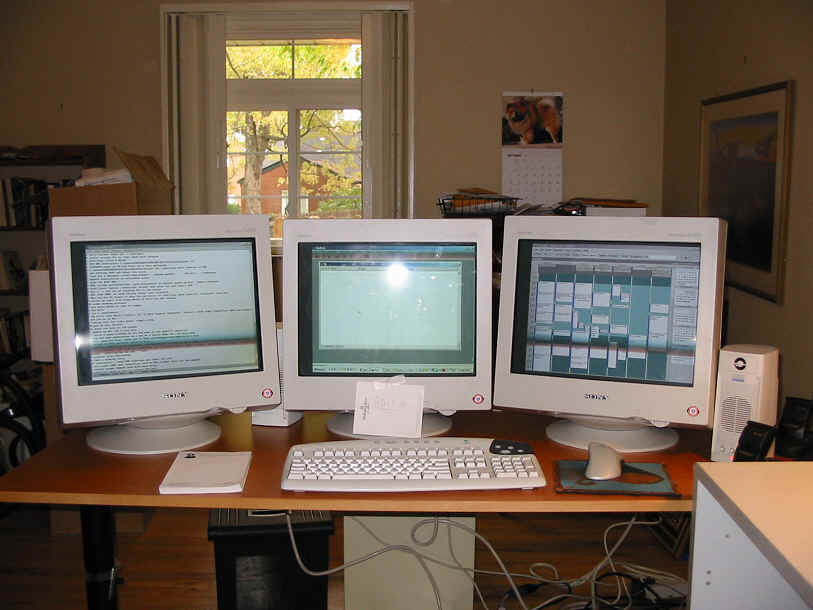
3 monitor workstation
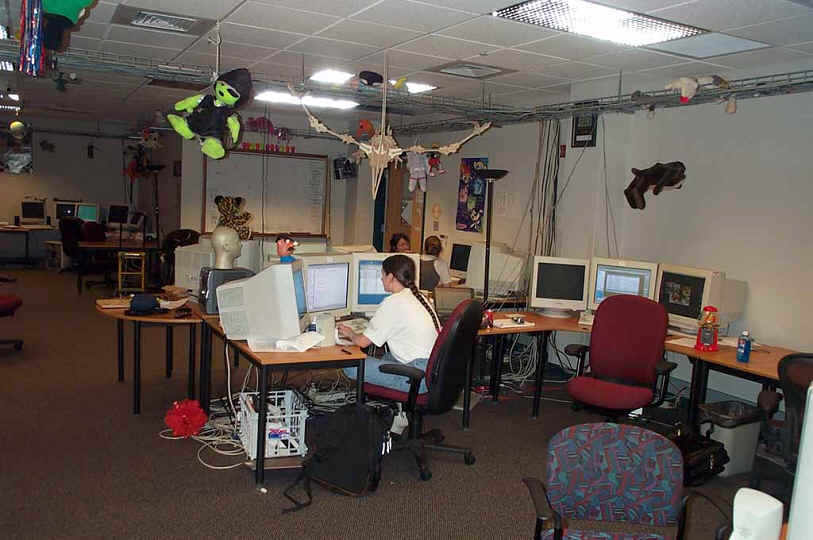
Randy's Stage 3 lab
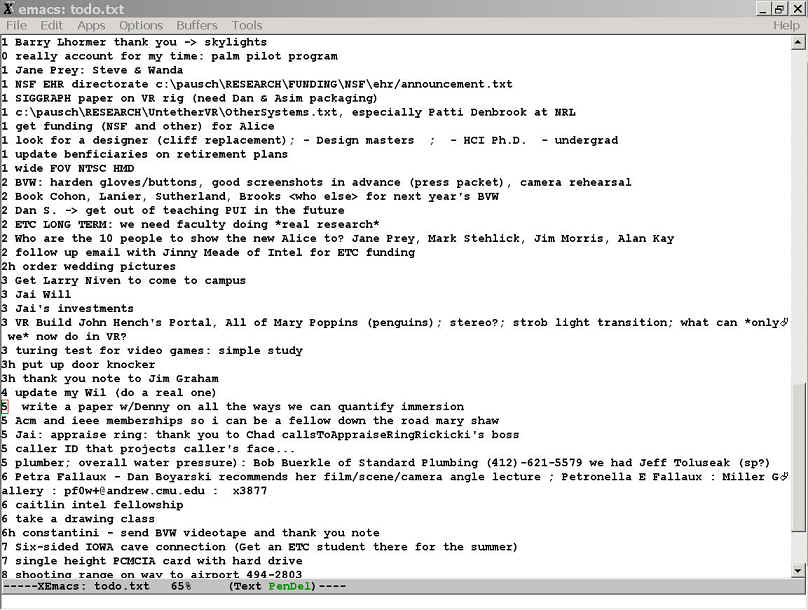
Example of TODO list (on one of the 3 screens)
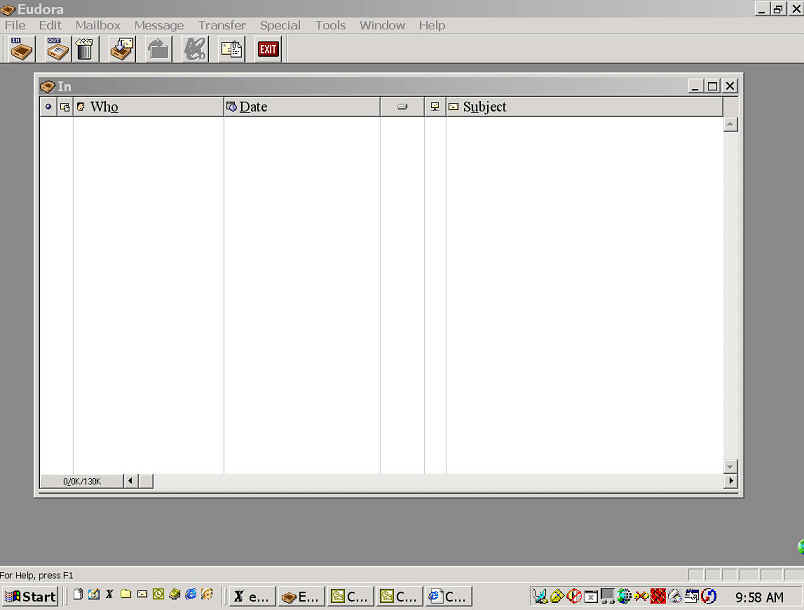
Example of email inbox (on one of the 3 screens)
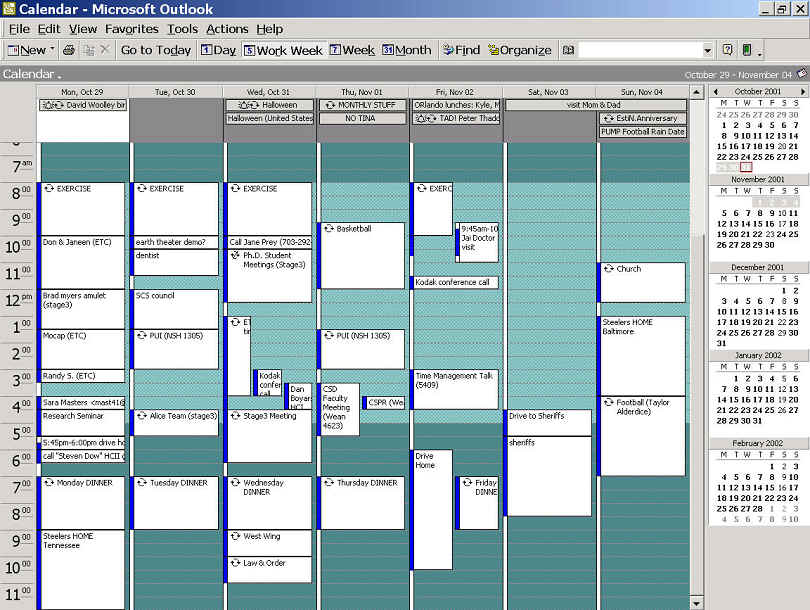
Example of Randy's Calendar program (on one of the 3 screens)
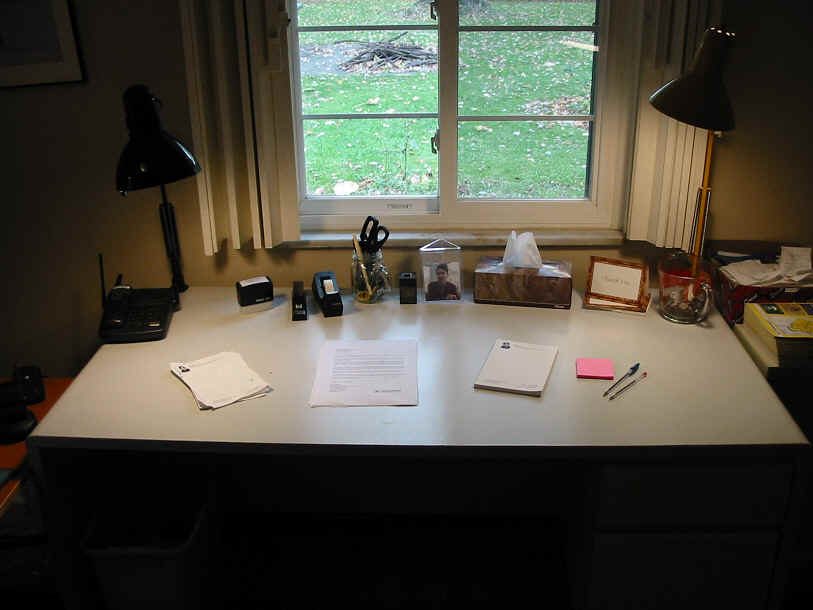
Close up of work space
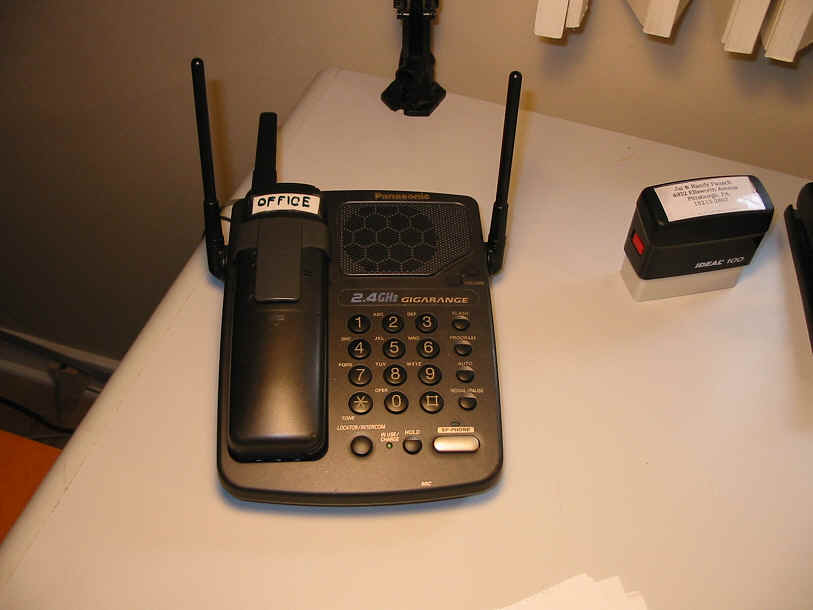
Close up of Phone: ***Speaker phone: hands are free to do something else; stress reduction while on hold
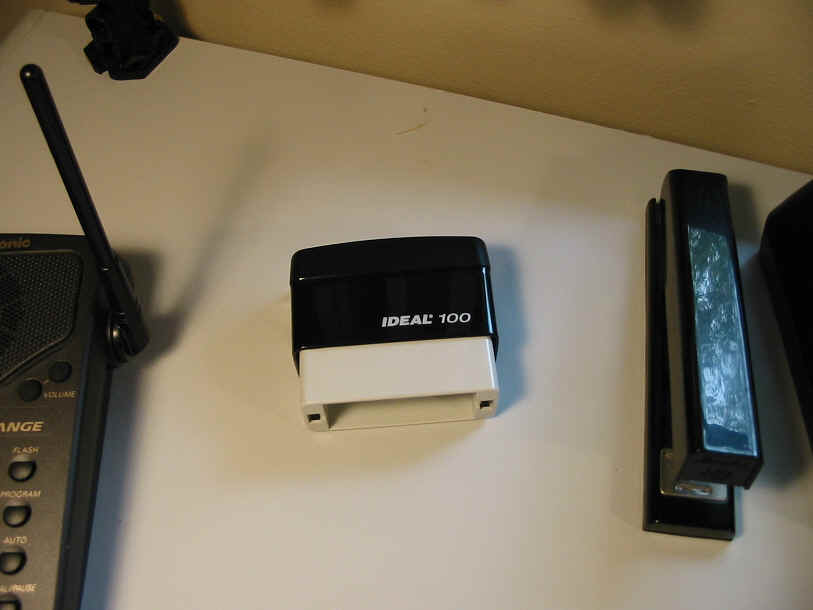
Return address stamper

Tissues

Thank you cards. ***
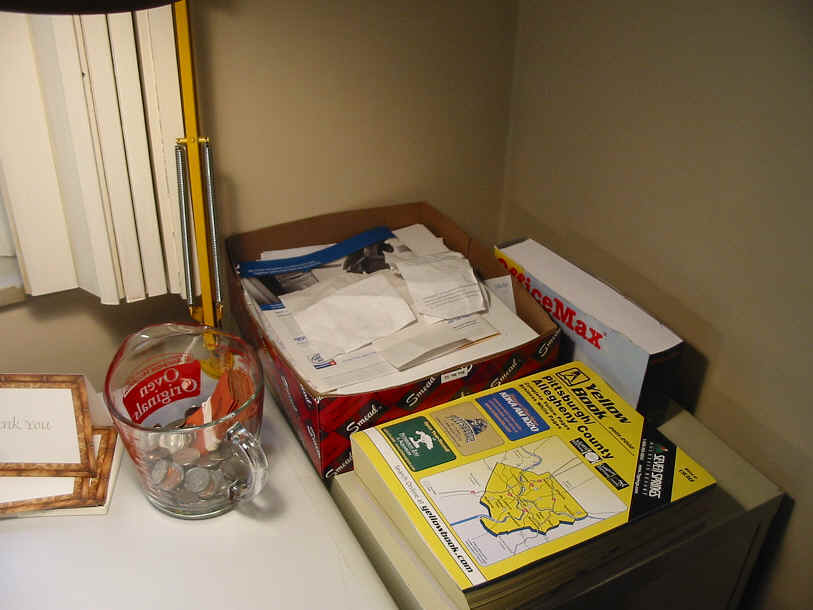
Recycle paper box
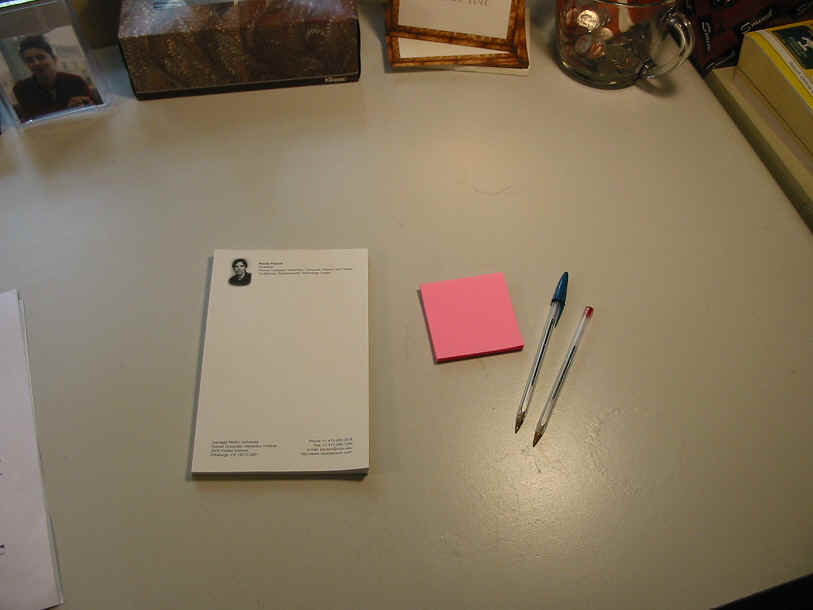
Post-it Notes, Pad and Pens

OUT boxex
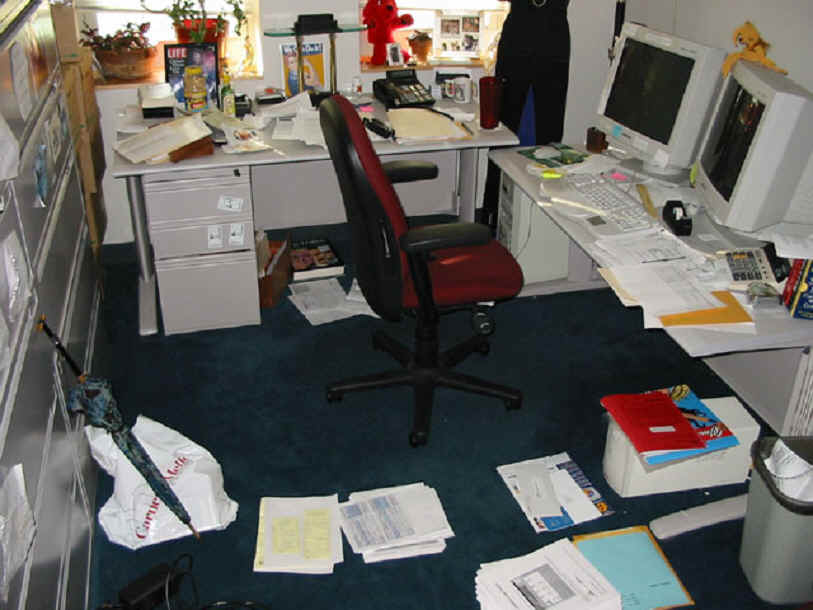
Image of Randy's Assistant's office. She uses all available horizontal space about an arm's length away. This allows her not to stack papers/files on top of each other and lose them.
Telephone
- Keep calls short; stand during call
- Start by announcing goals for the call
- Don't put your feet up
- Have something in view that you're waiting to get to next.
Reading Pile
- Only read something if you'll be fired for not reading it
- Note that this refers to periodicals and routine reading, which is different than a research dig
Office Logistics
- Make your office comfortable for you, and optionally comfortable for others
- No soft comfortable chairs! I have folding chairs, some people cut off front legs
Scheduling Yourself
- You don't find time for important things, you make it.
- Everything you do is an opportunity cost.
- Learn to say “No”
Learn to say No
- Will this help me get tenure?
- Will this help me get my masters?
- Will this help me get my Ph.D.?
- keep “help me” broadly defined
Gentle Nos
- “I'll do it if nobody else steps forward;” “I'll be your deep fall back,” but you have to keep searching.
- Moving parties in grad school. . .
Everyone has Good and Bad Times
- Find your creative/thinking time. Defend it ruthlessly, spend it alone, maybe at home
- Find your dead time. Schedule meetings, phone calls, and mundane stuff during it
Interruptions
- 6-9 minutes, 4-5 minute recovery — five interruptions shoots an hour
- You must reduce frequency and length of interruptions
- Blurting: save-ups
- E-mail noise on new mail is an interruption – TURN IF OFF!!***
Cutting Things Short
- “I'm in the middle of something now…”
- start with “I only have 5 minutes” — you can always extend this
- Stand up, scroll to door, complement, thank, shake
- Clock-watching; on wall behind them
Time Journals
- It's amazing what you learn!
- Monitor yourself in 15 minute increments for between 3 days and two weeks
- Update every 1/2 hour: not at end of day
Using Time Journal Data
- What am I doing that doesn't really need to be done?
- What am I doing that could be done by someone else?
- What am I doing that could be done more efficiently?
- What do I do that wastes others' time?
Procrastination
“Procrastination is the thief of time”
Edward Young
Night Thoughts, 1742
Balancing Act
“Work expands so as to fill the time available for its completion”
Parkinson's Law
Cyril Parkinson, 1957
Avoiding Procrastination
- Doing things at the last minute is much more expensive than just before the last minute
- Deadlines are really important: establish them yourself!
Comfort Zones
- Identify why you aren't enthusiastic
- Fear of embarrassment
- Fear of failure?
- Get a spine!
Delegation
- No one is an island
- You can accomplish a lot more with help
- Most delegation in your life is from faculty to graduate student
Delegation is not dumping
- Grant authority with responsibility.
- Concrete goal, deadline, and consequences
- Treat your people well
- Grad students and secretaries are a faculty member's lifeline; they should be treated well!
Challenge People
- People rise to the challenge: You should delegate “until they complain”
- Communication Must Be Clear: “Get it in writing” — Judge Wapner***
- Give objectives, not procedures.
- Tell the relative importance of this task
Sociology
- Beware upward delegation!
- Reinforce behavior you want repeated
- Ignorance is your friend — I do not know how to run the photocopier or the fax machine
Meetings
- Average executive: > 40% of time
- Lock the door, unplug the phone
- Maximum of 1 hour
- Prepare: there must be an agenda
- 1 minute minutes: an efficient way to keep track of decisions made in a meeting: who is responsible for what by when?***
Technology
- “Computers are faster, but they take longer” — Janitor, UCF
- Secretaries are better than answering machines; where are the costs & benefits of a technology? (transcription)
- Laptop computer (and docking station)***
- You can scavenge time and work anywhere
- At CMU, you still have internet access
- One machine in your life is the right number
- WWW; only do things once (post them)
- Google (now with image search!)
- ACM Digital Library (I haven't been in the library in over five years)
Randy's Magic E-Mail Tips ***
- Save all of it; no exceptions
- If you want somebody to do something, make them the only recipient. Otherwise, you have diffusion of responsibility. Give a concrete request/task and a deadline.
- If you really want somebody to do something, CC someone powerful.
- Nagging is okay; if someone doesn't respond in 48 hours, they'll probably never respond. (True for phone as well as email).
Care and Feeding of Advisors: Time management Advice
- Get a day timer or PDA
- Write things down
- When's our next meeting?
- What's my goal to have done by then?
- Who to turn to for help?
- Remember: advisors want results!
Care and Feeding of Advisors: Life Advice
- They know more than you do
- They care about you
- They didn't get where they are by their social skills – take the initiative in talking with them!
General Advice: Vacations
- Phone callers should get two options:
- If this can't wait, contact John Smith at 555-1212
- otherwise, please call back June 1
- This works for Email too!
- Vacations should be vacations***
- It's not a vacation if you're reading email
- Story of my honeymoon. . .
General Advice
- Kill your television (how badly do your want tenure or your degree?)***
- Turn money into time – especially important for people with kids or other family commitments
- Eat and sleep and exercise. Above all else!***
- Never break a promise, but re-negotiate them if need be.
- If you haven't got time to do it right, you don't have time to do it wrong
- Recognize that most things are pass/fail.
- Feedback loops: ask in confidence***
Recommended Readings
- The One Minute Manager, Kenneth Blanchard and Spencer Johnson, Berkeley Books, 1981, ISBN 0-425-09847-8
- The Seven Habits of Highly Effective People, Stephen Covey, Simon & Schuster, 1989, ISBN 0-671-70863-5
Action Items***
- Get a day-timer (or PDA) if you don't already have one
- Start keeping your TODO list in four-quadrant form or ordered by priorities (not due dates)
- Do a time journal, or at least record number of hours of television/week
- Make a note in your day-time to revisit this talk in 30 days (www.randypausch.com). At that time, ask yourself “What behaviors have I changed?”
Appendix
- Stephen Covey's “Seven Habits”
- Advice I have for working in groups
The Seven Habits
From: The Seven Habits Of Highly Effective People: Restoring the Character Ethic, by Stephen R. Covey, Simon and Schuster, 1989.
1. BE PROACTIVE. Between stimulus and response in human beings lies the power to choose. Productivity, then, means that we are solely responsible for what happens in our lives. No fair blaming anyone or anything else.
2. BEGIN WITH THE END IN MIND. Imagine your funeral and listen to what you would like the eulogists to say about you. This should reveal exactly what matters most to you in your life. Use this frame of reference to make all your day-to-day decisions so that you are working toward your most meaningful life goals.
3. PUT FIRST THINGS FIRST. To manage our lives effectively, we must keep our mission in mind, understand what's important as well as urgent, and maintain a balance between what we produce each day and our ability to produce in the future. Think of the former as putting out fires and the latter as personal development.
4. THINK WIN/WIN. Agreements or solutions among people can be mutually beneficial if all parties cooperate and begin with a belief in the “third alternative”: a better way that hasn't been thought of yet.
5. SEEK FIRST TO BE UNDERSTANDING, THEN TO BE UNDERSTOOD. Most people don't listen. Not really. They listen long enough to devise a solution to the speaker's problem or a rejoinder to what's being said. Then they dive into the conversation. You'll be more effective in your relationships with people if you sincerely try to understand them fully before you try to make them understand your point of view.
6. SYNERGIZE. Just what it sounds like. The whole is greater than the sum of its parts. In practice, this means you must use “creative cooperation” in social interactions. Value differences because it is often the clash between them that leads to creative solutions.
7. SHARPEN THE SAW. This is the habit of self-renewal, which has four elements. The first is mental, which includes reading, visualizing, planning and writing. The second is spiritual, which means value clarification and commitment, study and meditation. Third is social/emotional, which includes service, empathy, synergy and intrinsic security. Finally, the physical element includes exercise, nutrition and stress management.
Tips for Working in Groups
By Randy Pausch, for the Building Virtual Worlds course at Carnegie Mellon, Spring 1998
Meet people properly. It all starts with the introduction. Then, exchange contact information, and make sure you know how to pronounce everyone's names.Exchange phone #s, and find out what hours are acceptable to call during.
Find things you have in common. You can almost always find something in common with another person, and starting from that baseline, it's much easier to then address issues where you have differences.This is why cities like professional sports teams, which are socially galvanizing forces that cut across boundaries of race and wealth.If nothing else, you probably have in common things like the weather.
Make meeting conditions good. Have a large surface to write on, make sure the room is quiet and warm enough, and that there aren't lots of distractions.Make sure no one is hungry, cold, or tired.Meet over a meal if you can; food softens a meeting.That's why they ôdo lunchö in Hollywood.
Let everyone talk. Even if you think what they're saying is stupid.Cutting someone off is rude, and not worth whatever small time gain you might make.Don't finish someone's sentences for him or her; they can do it for themselves.And remember: talking louder or faster doesn't make your idea any better.
Check your egos at the door. When you discuss ideas, immediately label them and write them down.The labels should be descriptive of the idea, not the originator: ôthe troll bridge story,ö not ôJane's story.ö
Praise each other. Find something nice to say, even if it's a stretch.Even the worst of ideas has a silver lining inside it, if you just look hard enough.Focus on the good, praise it, and then raise any objections or concerns you have about the rest of it.
Put it in writing. Always write down who is responsible for what, by when.Be concrete.Arrange meetings by email, and establish accountability.Never assume that someone's roommate will deliver a phone message. Also, remember that ôpolitics is when you have more than 2 peopleö û with that in mind, always CC (carbon copy) any piece of email within the group, or to me, to all members of the group.This rule should never be violated; don't try to guess what your group mates might or might not want to hear about.
Be open and honest. Talk with your group members if there's a problem, and talk with me if you think you need help.The whole point of this course is that it's tough to work across cultures.If we all go into it knowing that's an issue, we should be comfortable discussing problems when they arise — after all, that's what this course is really about. Be forgiving when people make mistakes, but don't be afraid to raise the issues when they come up,
Avoid conflict at all costs. When stress occurs and tempers flare, take a short break. Clear your heads, apologize, and take another stab at it.Apologize for upsetting your peers, even if you think someone else was primarily at fault; the goal is to work together, not start a legal battle over whose transgressions were worse. It takes two to have an argument, so be the peacemaker.
Phrase alternatives as questions. Instead of “I think we should do A, not B”, try “What if we did A, instead of B?”That allows people to offer comments, rather than defend one choice.
Credit:
Carnegie Mellon University
http://www.randypausch.com
P.S. Office managers: save time and money with workforce management software. These systems allow you to easily log hours, track projects, and keep everything tidy and organized with the click of a button.
You might also be interested in…
- Getting Things Done: The Art of Stress-Free Productivity
- The Skinny on Time Management: How to Maximize Your 24-Hour Gift
- Successful Time Management For Dummies
- Time Warrior: How to defeat procrastination, people-pleasing, self-doubt, over-commitment, broken promises and chaos
- The Accomplishing More With Less Workbook: How to accomplish more in less time, less effort, and less stress!
- The 25 Best Time Management Tools & Techniques: How to Get More Done Without Driving Yourself Crazy
- Time Tactics of Very Successful People
- Time Management: Increase Your Personal Productivity And Effectiveness (Harvard Business Essentials)
***************
Recommended Resources
FREE Time Management eBook: Work The System – The Simple Mechanics of Making More and Working Less – Discover The Exact Blueprint Used By Sam Carpenter To Reduce His Work Week To Just 2 Hours And Multiple His Income By More Than 20 Times…
***************
Love this article? Sign up for my FREE Personal Development Email Newsletter today to receive more articles like this!
Incoming search terms:
- time management
- 7 habits
- covey time management
- 7 habits of highly effective people
- stephen covey time management
- 4 quadrants of time management
- time management covey
- stephen r covey
- seven habits
Tagged as: Randy Pausch · Time Management · Time Management for Lazy People · Time Management Lecture · Time Management Summary
Or check out this highly recommended personal development product...
If you've enjoyed this article, please make a small $5 donation to support this blog:
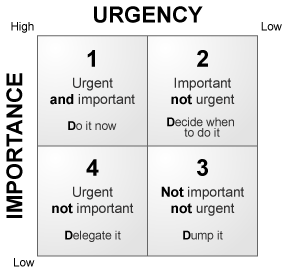
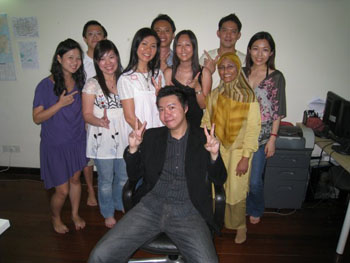
Great article, Thanks!
Time management in a smart way – critical to any success.
All part of the Art of Productive Laziness!
The lazy project manager illustrates how anyone can apply the simple techniques of lazy project management in their own activities in order to work more effectively and consequently improve work-life balance. This ‘productive laziness’ approach builds on the Pareto principle that states that for many phenomena, 80 per cent of consequences stem from 20 per cent of the causes. To put it simply, only 20 per cent of the things people do during their working days really matter.
Inside this insightful and informative book you’ll discover:
• The intelligence of laziness – why smart, lazy people have the edge over others;
• Why the Jungle Book’s ‘Bare Necessities’ should be the productive lazy theme tune;
• How to get the maximum output for a minimised input;
• Quick tips to productive lazy heaven.
In addition you can learn some really interesting things about eating dinosaurs, wearing ermine cloaks, and how to spot a psychopathic woman at a funeral. Also find out why you should never go ballooning, how to deliver a good Oscar acceptance speech, and why it is important for your team that you read the newspaper each morning.
And yes, you may also learn some, quick, simple but incredibly important things about project management. If you are lazy enough.
hey,
thanks for the summary, it is a real help and greatly appreciated.
btw, i think there might be a mistake in the covey’s four quandrants here. i think the 3 and 4 are in the wrong order…
thanks again!
In this modern world the art of Management has become a part and parcel of everyday life, be it at home, in the office or factory and in Government. In all organizations, where a group of human beings assemble for a common purpose irrespective of caste, creed, and religion, management principles come into play through the management of resources, finance and planning, priorities, policies and practice. Management is a systematic way of carrying out activities in any field of human effort. Management need to focus more on leadership skills, e.g., establishing vision and goals, communicating the vision and goals, and guiding others to accomplish them. It also assert that leadership must be more facilitative, participative and empowering in how visions and goals are established and carried out. Some people assert that this really isn’t a change in the management functions, rather it’s re-emphasizing certain aspects of management.
Its task is to make people capable of joint performance, to make their weaknesses irrelevant, says the Management Guru Peter Drucker. It creates harmony in working together – equilibrium in thoughts and actions, goals and achievements, plans and performance, products and markets. It resolves situations of scarcity, be they in the physical, technical or human fields, through maximum utilization with the minimum available processes to achieve the goal. Lack of management causes disorder, confusion, wastage, delay, destruction and even depression. Managing men, money and materials in the best possible way, according to circumstances and environment, is the most important and essential factor for a successful management.
Have you seen Randy Pausch’s Last Lecture? That one too is inspiring and is full of learnings.
i nead help!
Thanks for the Fruit Juice, Peter…
Appreciate it =D
Yeah, it was one hell of a presentation!
Cheers!
Fantastic – thats just what I wanted after watching the Randy Pausch vid. That was a superb presentation. Thanks from a fellow BMMer